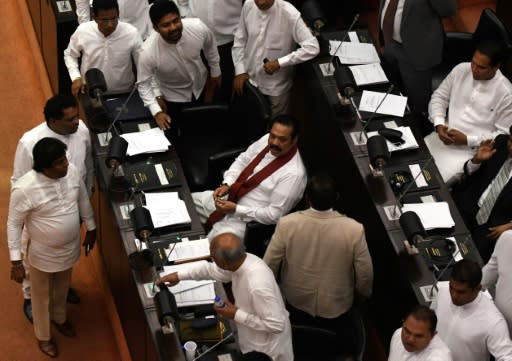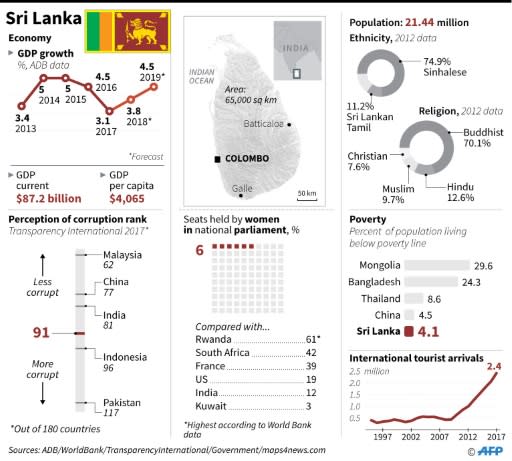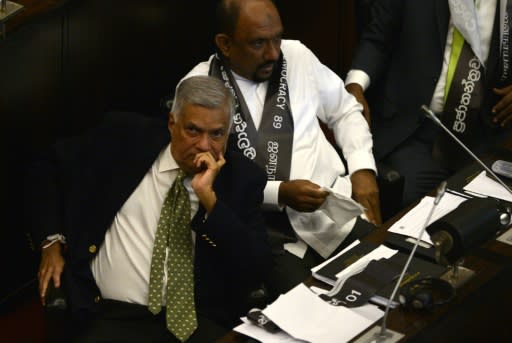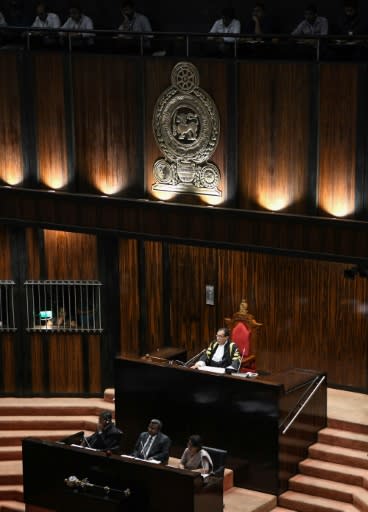Sri Lanka parliament sacks Rajapakse, crisis deepens
Sri Lanka's parliament on Wednesday voted out the bitterly disputed government of former strongman Mahinda Rajapakse, removing one controversial figure but triggering another showdown with a hostile president. Colombo was in the grip of a power vacuum as a 19-day-old government was defeated on the floor of the legislature, effectively leaving the country without a prime minister and a cabinet of ministers. The island nation has been in crisis since the president sacked Prime Minister Ranil Wickremesinghe on October 26 and replaced him with Rajapakse, who served as president until being voted out three years ago. On Tuesday the Supreme Court overruled President Maithripala Sirisena's dissolution of parliament and halted preparations for a snap election, in a major boost for the ousted prime minister. In stormy scenes Wednesday, legislators gave their verdict on the two rivals -- with a majority in the 225-member assembly supporting a no-confidence motion against Rajapakse. Parliament also passed motions declaring illegal the November 9 proclamations made by Sirisena to enshrine the power shift. However, the result does not yet mean that Wickremesinghe, who has refused to leave the prime minister's residence, has won the constitutional showdown. In his first response to the tumultuous events in parliament, Sirisena accused Speaker Karu Jayasuriya of violating legislative traditions. He said signatures of 122 legislators who opposed Rajapakse had not been certified as genuine, but stopped short of an outright rejection of resolution against his nominee for prime minister. An aide of the president had earlier suggested that Sirisena was likely to hand over power to Wickremesinghe's United National Party (UNP), which remains the largest single group in the assembly, after the vote. Day-to-day administration in Sri Lanka remains paralysed as the crisis drags on. Constitutionally, it is the president who is empowered to appoint a new prime minister. The UNP said that Sirisena must now call on Wickremesinghe to form a new government. Wickremesinghe, who left his bunker at the Temple Trees official residence for the first time in nearly three weeks to go to parliament, hailed the vote. "This is a victory for the people," Wickremesinghe told reporters, condemning the president's actions as "illegal". He said officials should no longer take orders from the Rajapakse-led "purported government". - Loyalists flee - In a chaotic session, 72-year-old Rajapakse and his legislator son Namal walked out of the red-carpeted chamber just before the vote was taken. "The ayes have it," the speaker announced. "I rule that this House does not have confidence in the government (of Rajapakse)." Several Rajapakse ministers came out of parliament accusing the speaker of violating parliamentary norms. "He has no bloody business calling a vote," Leader of the House Dinesh Gunawardena said. Shortly after the collapse of Rajapakse's administration, three of his ministers switched to Wickremesinghe's side. Sirisena dissolved parliament on Friday, shortly after an admission that Rajapakse did not have a majority. Several UNP legislators said they were offered up to $2.8 million to defect. Sirisena ordered a snap election on January 5, a move the independent Elections Commission announced was unconstitutional and illegal. A dozen petitions were filed in the Supreme Court which on Tuesday restored parliament and suspended the January 5 vote. Parliament held its first session following the court ruling under tight security. Thousands of armed police, including commandos, deployed along the key approach roads to parliament, which is located on a man-made lake island, with several anti-riot units on standby. Parliament officials had feared that supporters of Rajapakse's party might try to stop legislators from getting to parliament, but those concerns proved unfounded. A majority of Sri Lanka's parliament supported a no-confidence motion against former president and currently appointed prime minister, Mahinda Rajapakse (C) A majority of Sri Lanka's parliament supported a no-confidence motion against former president and currently appointed prime minister, Mahinda Rajapakse (C) Sri Lanka has been in crisis since the president sacked prime minister Ranil Wickremesinghe (L) Several Rajapakse ministers accused Sri Lanka's parliament speaker, Karu Jayasuriya, of violating parliamentary norms by holding the crucial no-confidence vote





